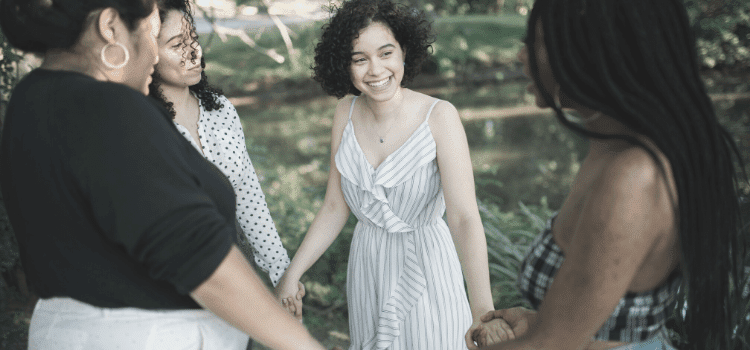Do you find yourself feeling drained or overwhelmed?
Is it a constant struggle to eat three meals a day let alone find time for yourself?
Do you say yes to all the things?
Products and services are sold in the name of “self-care” as answers to the emptiness and lack so many are feeling. Maybe it isn’t you though. Maybe there is a bigger picture. For those, really in need of more nourishment the idea of “self-care” can feel like one more thing we are failing at. “Can I really squeeze in that massage, meditation, bubble bath when I am holding all the things?” How can we create a community of caring in our lives?
The list of to-dos we carry can be extensive: summer camp sign up, summer camp logistics, grocery lists, dinner menu, cooking of the dinner, the work holiday party, school pick up and drop off, school PTSO, the teacher gifts, our child’s school assignments, kid’s shopping, haircuts, household shopping not including groceries, holiday plans, holiday shopping, all of the work things, the parties, social-emotional development, play dates, the birthday gifts, social events, more play dates, vacation getaways, the vacation itinerary, packing of all the things, laundry, running the chore list, the dry cleaning, the 504 plans, the IEPs, the activities, the logistics of said activities, are we running low on paper towels?
And for those caregivers in the back raising children with a chronic disease or neurodivergence. I see you too. Let’s add another 10 running tabs for you.
It has taken me more than a decade to understand the power and space a “community of caring” can offer. And it still takes daily effort.
This starts with spreading the load. For those that carry the load in our household, we tend to take on all the “tabs.” These tabs can be labeled as grocery shopping, kids’ activities, family social life, house cleaning, cooking, child-rearing, and much more. Under each tab is a list of things to do.
This isn’t to say some of us are not blessed with caring and loving partners. We may assign duties to others but one person is typically the keepers of the tabs. Much of the time when we enter marital bliss we take on unspoken agreements based on our gender roles. Not always, but in some partnerships, the woman may carry a few more tabs, i.e. household responsibilities, child-rearing, family social life, just to name a few.
Space and power come in laying all of the tabs on the table and dividing. The mental load of all the tabs wears us down. The bubble bath, the wine, the candle, the massage are band-aids. True change and cultural shifts happen by looking at our life, asking for help, letting go of some of the tabs, and creating more space for ourselves.
Here are ways to create more space:
- Create a schedule with routines
- Planning extra time for everything
- Giving your partner some of the tabs – not just a to do list
- Assigning your children more responsibility and autonomy
- Hire a house cleaner
- Ask your extended family or friends to babysit
- Hire a teenager to help around the house
- Find a gym with childcare
- Define your values
- Learn to say, “Sorry I can’t take that on right now” or “Let me sit with it and get back to you.” If it isn’t a “hell yes” don’t do it!
What are you willing to let go of to create a community of caring?
What can be delegated or edited out altogether to give you more space and create a community of caring? I often say life is not made up of grand gestures, but the tiny things we do every day. How are we spending our time? Is it lining up with what we value? Are we using strengths to bring vitality to our life? Do we have emotional and mental weight bringing down our energy?
Coaching allows us to sit with ourselves and answer these questions. In doing so we determine where change needs to happen in order to live a more balanced and whole existence. There is no recipe for a well-lived life but we do have basic needs like fruits, vegetables, water, sunshine, physical activity, sleep, and mindfulness. We need positive social connections along with a sense of meaning and purpose. We need to practice activities that bring us joy. But it starts with creating space for these things to live.
Creating space in our lives breathes a softness to live.
Once we have more space mentally and emotionally we can begin to add things to our life that bring us into balance. Here are a few suggestions:
- Feeling daily gratitude (fake it ‘til you make it)
- Weekly date night with your partner
- Connecting with nature
- Monthly coffee date with a friend
- Define what brings you joy and doing more of that (think back to childhood/adolescence)
- Solo getaway – a few hours or overnight
- Discover your strengths
- Mindfulness-based stress reduction
- Volunteer in your community (yes, this counts!)
- Connect with your body.
Allow yourself to create space. Then sit with yourself and discover what you need to let go of so you can begin to nourish your body, mind, and spirit. I wish you nothing but love on this journey of discovery.
As a certified coach, I specialize in using research-based methods and practices that will teach you how to cut the clutter out of your life and focus on yourself. Bringing yourself into balance and bringing yourself home. In essence, creating a community of caring – for you!
This post was inspired by Dr. Travis Heath’s Ted Talk: Self Care to Communities of Care
and Glennon Doyle’s podcast: We Can Do Hard Things – OVERWHELM: Is our exhaustion a sign that we’re CareTicking time bombs?
Click here for a complimentary consultation.
About Balanceology
Janna Burnam, founder of Balanceology, helps teens and parents create routines, habits, and rituals that lead to more balanced living. As a teen Janna struggled to communicate and suffered from severe anxiety. As an adult Janna was diagnosed with ADHD, still suffers from anxiety although much less than before, and is still learning to be authentically her.
Janna created Balanceology from her experience in order to help teens and adults with moderate anxiety and general overwhelm. Janna helps parents create a balanced life through research-based practices that help them stay calm and centered – in order to thrive as a family.

